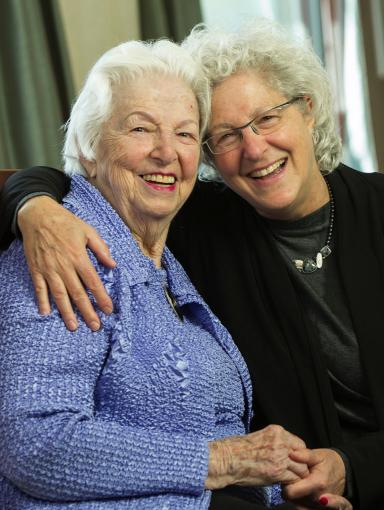Researchers Identify Gene that Determines Bone Density and Fracture Risk
Decoding Genetics of Osteoporosis May Prevent Fractures in Older Adults
BOSTON — Researchers from Harvard-affiliated Hebrew SeniorLife Institute for Aging Research (IFAR), in collaboration with scientists from a number of international institutes, have identified a genetic variant regulating a gene responsible for bone mineral density and fracture risk. Findings from this study—funded in part by grants from the National Institutes of Health (NIH)—are published in the journal Nature and could lead to interventions that may prevent fractures in older adults.
Osteoporosis, a word meaning “porous bone,” is a disease that weakens bones, making them brittle and susceptible to fracture. According to the NIH, an estimated 53 million Americans have osteoporosis or are at risk of developing the disease due to low bone mass. Previous research has found risk factors such as age, gender, ethnicity, and family history contribute to the development of osteoporosis.
“Our study explores the hereditary aspect of osteoporosis by investigating the role our genes play in determining bone mineral density and who is at risk of fracture due to low bone density,” explains senior author Douglas Kiel, M.D., M.P.H., Director of the Musculoskeletal Research Center at IFAR, Hebrew SeniorLife in Boston, Professor of Medicine, Harvard Medical School and Associate Member of the Broad Institute of Harvard and MIT. “Understanding the genomics underlying skeletal fragility (osteoporosis) may lead to preventative interventions that ultimately reduce fractures as we age.”
For the present study, the research team sequenced the entire genome of more than 2,800 people and combined this with exome sequencing as well as another 3,500 people with “deep imputation” of their genotyping results, which is a way to fill in information about the unanalyzed portions of the genome by incorporating the data coming from the 2,800 people with sequencing of their genomes. The results confirmed that some of the genetic variants were associated with bone mineral density by comparing their data with information from more than 20,000 other research participants. The investigators then looked at data from many other studies (totaling more than half-a-million people) and determined that some of these variants also influenced a person’s risk of breaking a bone.
Study results show that a gene involved at the earliest stages of human development, the engrailed homeobox-1 gene, plays a central role in regulating bone density. This is the first time that researchers have connected the gene’s product, the protein EN1, to bone biology in adults. Furthermore, this study validates the use of whole-genome, sequencing-based discovery and deep imputation as sound methods for identifying novel genetic associations. “This study is one of several that have identified relatively rare sequence variants associated with complex phenotypes and disorders, such as osteoporotic fractures and low BMD in general populations, suggesting the value of applying whole genome sequencing in identifying genetic determinants of common disorders,” according to Dr. Yi-Hsiang Hsu, one of the lead authors and a statistical geneticist at Hebrew SeniorLife Institute for Aging Research, Harvard Medical School, Harvard School of Public Health and the Broad Institute of Harvard and MIT.
Dr. Kiel says, “Our findings enhance understanding of the genetics underlying the development of osteoporosis. Ideally, genomic research will one day lead to more personalized interventions (precision medicine) that, in this case, will reduce bone loss and prevent fractures in older adults.”
Dr. Kiel’s work was funded by grants R01AR061162 and R01AR041398 from the NIH’s National Institute of Arthritis and Musculoskeletal and Skin Diseases (NIAMS).This work is solely the responsibility of the authors and does not necessarily represent the official views of the NIAMS or NIH. This work was partially supported by the National Heart, Lung and Blood Institute's Framingham Heart Study (Contract No. N01-HC-25195) and its contract with Affymetrix, Inc. for genotyping services (Contract No. N02-HL-6-4278). Funding for sequencing was supported by NHLBI grant 5RC2HL102419 through the American Recovery and Reinvestment Act of 2009 (ARRA) for the project, Building on GWAS for NHLBI-diseases: the U.S. CHARGE consortium (CHARGE-S). Funding for genotyping was supported by NIAMS grant RC2AR058973 through the ARRA for the project, GWAS in MrOS and SOF. The NIH’s National Institute on Aging, National Center for Advancing Translational Sciences, National Cancer Institute and National Human Genome Research Institute also provided support.
About Nature
Nature is a weekly international journal publishing the finest peer-reviewed research in all fields of science and technology on the basis of its originality, importance, interdisciplinary interest, timeliness, accessibility, elegance and surprising conclusions. Nature also provides rapid, authoritative, insightful and arresting news and interpretation of topical and coming trends affecting science, scientists and the wider public.
About the Institute for Aging Research
Scientists at the Institute for Aging Research seek to transform the human experience of aging by conducting research that will ensure a life of health, dignity and productivity into advanced age. The Institute carries out rigorous studies that discover the mechanisms of age-related disease and disability; lead to the prevention, treatment and cure of disease; advance the standard of care for older people; and inform public decision-making.
About Hebrew SeniorLife
Hebrew SeniorLife, an affiliate of Harvard Medical School, is a national senior services leader uniquely dedicated to rethinking, researching and redefining the possibilities of aging. Based in Boston, the non-profit, non-sectarian organization has provided communities and health care for seniors, research into aging, and education for geriatric care providers since 1903. For more information about Hebrew SeniorLife, visit https://www.hebrewseniorlife.org, follow us on Twitter @H_SeniorLife, like us on Facebook, or read our blog.
